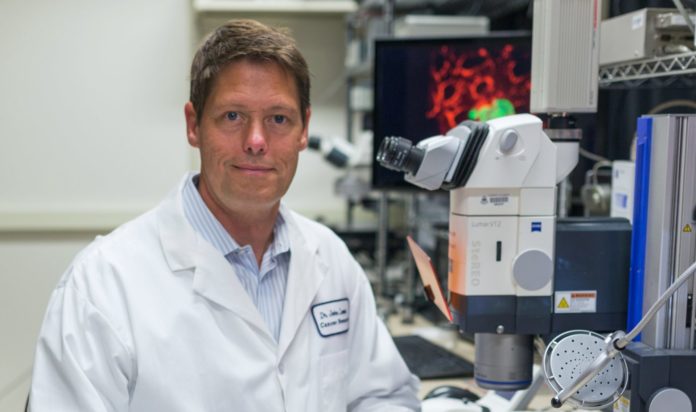An international team of researchers has uncovered a new mechanism that enables cancer cells to move throughout the body, providing a potential new target to stop metastasis, which is responsible for 90% of cancer deaths.
In findings published in Nature, the team identifies that cancer cells move faster when they are surrounded by thicker fluids, a change that occurs when lymph drainage is compromised by a primary tumour.
“This is really the first time that the viscosity of the extracellular fluid has been looked at in detail,” says John D. Lewis, professor and Bird Dogs Chair in Translational Oncology at the University of Alberta’s Faculty of Medicine & Dentistry.
“Now that we know that fluid viscosity signals cancer cells to move in a specific way, we can potentially use drugs to basically short-circuit that signalling pathway and encourage cancer cells to slow down, or even maybe to stop.”
The Lewis lab was invited to join the project led by researchers at Johns Hopkins University, because of its expertise in imaging human cancer cells in real-time motion using the placenta-like chorioallantoic membrane from fertilized chicken eggs.
“It’s basically a transparent, highly vascularized membrane that we can then put human cancer cells into,” Professor Lewis explains. “Because it’s flat, we can interface it with a microscope and take time-lapse images of individual cells as they migrate and move and respond to changes.”
“I would say we’re the world leaders in this type of imaging.
“Our contribution to the work was to very precisely show that cancer cells change their gene expression when they encounter increased viscosity in the surrounding fluid and become more aggressive. And even when you bring the viscosity back down, these cells stay more aggressive.
“We then went on to show that when this signalling pathway is perturbed in cancer cells it changes their ability to escape the bloodstream and metastasize.”
This is the third paper the international research team has published, and Professor Lewis is keen for it to continue. He gives credit to Konstantin Stoletov, senior research associate, for the bulk of his team’s work. He cautions that once a new therapeutic target is identified, it could take 10 to 15 years to develop and test a drug.
“But this is helping us build our understanding around how cancer cells move and it increases our chance of being successful with this whole approach,” he explains.
Professor Lewis is also founder and CEO of Entos Pharmaceuticals, which is developing a COVID-19 vaccine that could be stored in a refrigerator, thus making it easier to distribute in low- and middle-income countries than currently available vaccines. It entered Phase 2 clinical trials in Burkina Faso in September, but progress has been interrupted by a coup d’état there. Lewis says the trial may be moved to Senegal, and the vaccine may also be tested as a booster shot in Canada.


